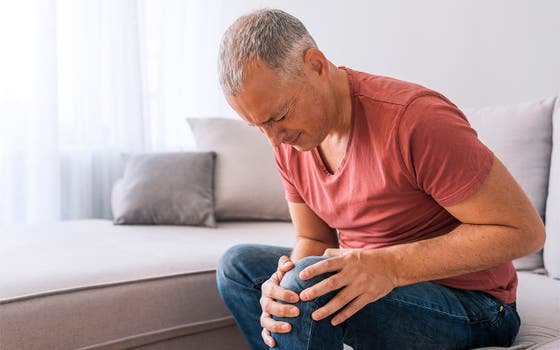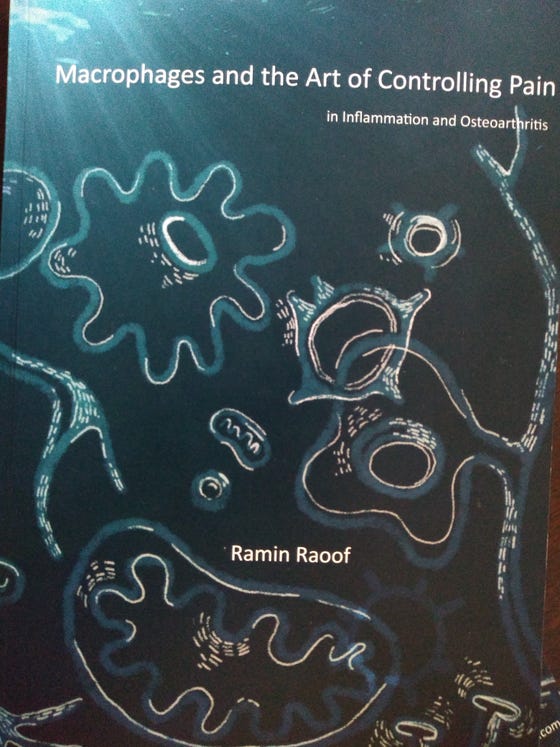Dec 12: Solution for chronic pain one step closer

Important steps have been taken at UMC Utrecht in understanding the cause of chronic pain associated with osteoarthritis and inflammation. This could also lead to new effective treatments in the future. More than 20 percent of the Dutch suffer from chronic pain. About 40 percent of this group has osteoarthritis. This type of chronic pain has been difficult to treat so far. Ramin Raoof obtained his PhD on 11 December for research into this.
Ramin Raoof (Center for Translational Immunology, UMC Utrecht) says: “At first glance, chronic pain appears to be a problem of the nervous system: pain nerve cells pick up pain stimuli and pass them on to the brain. However, recently there were indications from our group as well as other research groups that the immune system may also contribute to the development of chronic pain. In my research I investigated the role of a certain type of inflammatory cell in the immune system - the macrophage. These cells appear to play a key role in pain. They can make pain persist or expand. They do this independently of the original tissue damage and inflammation that triggered the pain. ”
Ramin: “Thanks to my study, we now understand how macrophages may cause pain or, on the contrary, dampen pain. This brings us one step closer to possible new effective treatments for chronic pain. For example, we can suppress pain-promoting macrophages or administer macrophages that can dilate pain.”
Cause of pain
Pain is caused by damage or inflammation in the body. Often the pain is not related to the degree of damage or inflammation. In addition, in many arthrosis or rheumatoid arthritis patients, pain persists even if the inflammation or damage has been resolved by, for example, therapy or knee replacement surgery. “The cause is gone, but the pain remains. This motivated me to do this research ”, says Ramin. “Together with colleagues from different disciplines at UMC Utrecht, I have discovered that the macrophage does not regulate pain at the location in the body where the inflammation or damage was, for example in the knee. The macrophages appear to travel to the spinal ganglia and actively promote pain there. Spinal ganglia are the nerve knots in the spinal cord. From this location macrophages send signals to nerve cells to maintain the pain.”
Disappearance of pain
In addition to a pain-promoting function, macrophages also have a pain-reducing function. To resolve pain, macrophages transfer their energy factories, so-called mitochondria, in vesicles to the cells of pain nerves. "So pain does not disappear passively when inflammation or damage in the body is resolved, but actively through the signals that the macrophages send out in nervous tissue," says Ramin. The function of the macrophage - promoting pain or reducing pain - is ultimately determined by the environment, in nerve cells in the spinal ganglia. These nerve cells seem to change macrophages so that they change from a pain-reducing type into a pain-promoting type.
Possible treatment
Ramin: “In my research we have also taken the first steps towards possible therapeutic options. In this way we can stimulate macrophages to become pain-relieving and inject them. We can also dampen the effect of pain-promoting macrophages. For example, by injecting a fusion protein developed by us that dampens pain very well. These options now need to be further explored. We will initially focus on people with osteoarthritis, but the discoveries can also have a positive impact on, for example, the treatment of pain in people with cancer or phantom pain. ”
PhD defense
Ramin Raoof (1987, Kerman, Iran) defended his PhD thesis on December 11, 2020 at Utrecht University. The title of his thesis was “Macrophages and the Art of Controlling Pain in Inflammation and Osteoarthritis”. Supervisors were prof. dr. Floris Lafeber (Dept. of Rheumatology and Clinical immunology, UMC Utrecht) and dr. Niels Eijkelkamp (Center for Translational Immunology, UMC Utrecht). Co-supervisor was dr. Simon Mastbergen (Dept. of Rheumatology and Clinical Immunology, UMC Utrecht). As of December 2020, Ramin Raoof works as a post-doc at Amsterdam UMC on immunotherapy research for multiple myeloma.

